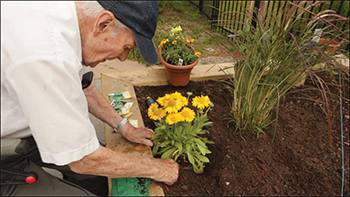 When we engage in activities that are meaningful to us, we experience an enhanced sense of identity, wellbeing and contentment. The same holds true for those who have been diagnosed with dementia. While dementia can impact a person’s physical dexterity and cognitive ability, the same innate sense of dignity and satisfaction can still be derived from taking part in pastimes that have some meaning or connection to who they were before their diagnosis.
When we engage in activities that are meaningful to us, we experience an enhanced sense of identity, wellbeing and contentment. The same holds true for those who have been diagnosed with dementia. While dementia can impact a person’s physical dexterity and cognitive ability, the same innate sense of dignity and satisfaction can still be derived from taking part in pastimes that have some meaning or connection to who they were before their diagnosis.
The key is making a connection between who the person was and where they are now. Understanding those commonalities can make a big difference to overall quality of life for both the person with dementia and their caregiver. Consider their past interests and experiences – things that motivated them and gave them joy. Chances are that with some modifications to accommodate their current abilities (and while always keeping safety front of mind), there are ways to enable the person to have some control over how they spend their time.
The key is to consider the needs, interests and abilities of the person to create a “failure-free” experience. Focusing on what the person can do as opposed to what they cannot helps to reduce the potential for frustration and anxiety because you are tapping into the essence of who they still are. With that said, there is still the potential for the person with dementia to discover new interests, abilities and talents. The key is to start by building on what they know and then go from there.
The McCormick Dementia Services Enhanced Caregiver Education series offers Strategies for Meaningful Activity Engagement to help caregivers develop ways to keep their loved one connected to their essential interests and identity. The session teaches caregivers how to simplify and present tasks, how to focus on the process, and how to recognize cues when modifications are necessary.
The full education series provides practical tools and techniques to help caregivers who are looking for effective ways to help with day-to-day interactions and address such topics as communication, understanding behaviours and personal care.
This free program is offered throughout the year, and registration is open for individual sessions or the full series. Contact us to learn more.